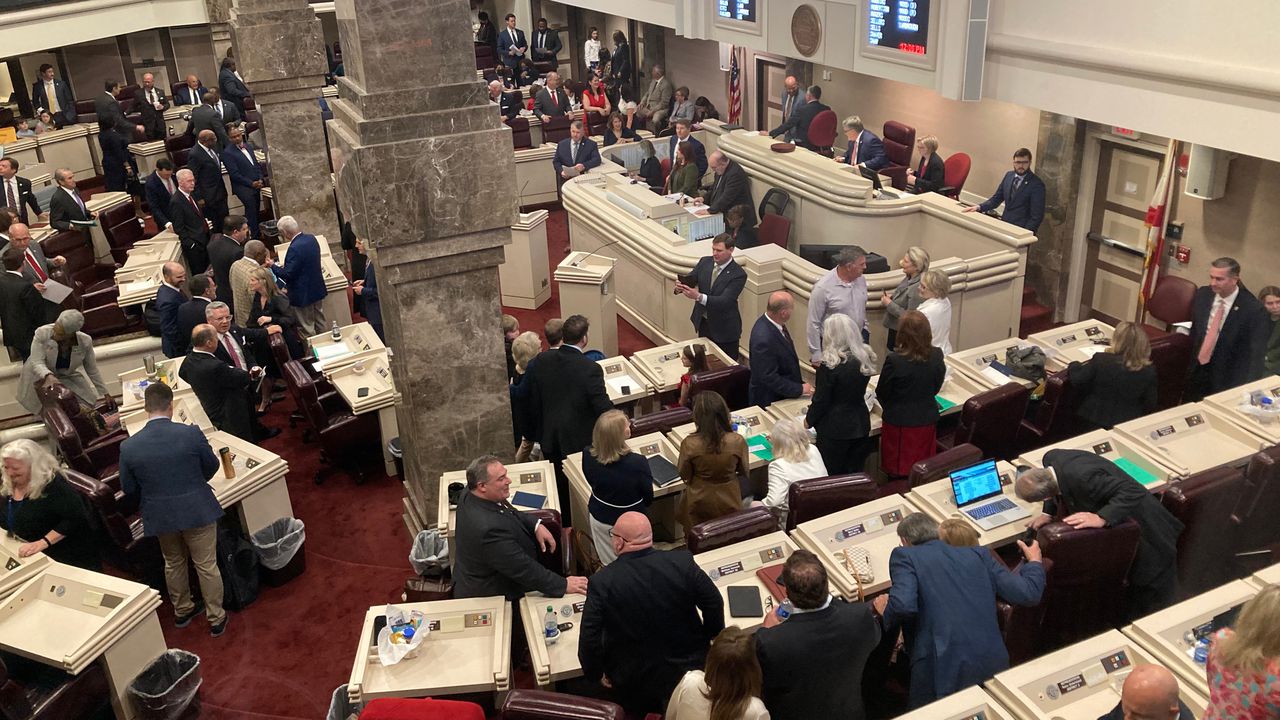Lawmaker on fentanyl bill: ‘Peddle death; you’re going behind bars’
A bill to impose mandatory prison times for distributing fentanyl is near the top of the agenda for Alabama lawmakers as they resume their regular session Tuesday.
Fentanyl is the leading cause of a surge in overdose deaths in Alabama and across the nation. More than 56,000 people in the United States died from overdoses of synthetic opioids like fentanyl in 2020, according to the CDC, an increase of 18-fold over 2013. In Alabama, overdose deaths involving fentanyl increased from 453 in 2020 to 1,069 in 2021, according to the Alabama 2023 Drug Threat Assessment.
The bill’s sponsor, Rep. Matt Simpson, R-Daphne, said a Baldwin County prosecutor brought to his attention that fentanyl traffickers do not face mandatory prison time.
“If you’re trafficking heroin, if you’re trafficking methamphetamine, if you’re trafficking cocaine, heck, even if you’re trafficking marijuana, there is a mandatory minimum sentence,” said Simpson, a former prosecutor in Baldwin and Mobile counties. “Fentanyl is the only drug in Alabama where there is no mandatory minimum. And you look and you see how fentanyl has overtaken our communities.”
Simpson’s bill is the first on the agenda for the House Judiciary Committee on Wednesday and could be up for a vote as early as Thursday in the House. It says a person who sells, manufactures, delivers, brings into the state, or knowingly possesses one gram or more of fentanyl is guilty of trafficking. The penalty would be a mandatory three years in prison and a fine of at least $50,000 for at least one gram but less than two grams. The penalties would be much stiffer for larger amounts: for two to four grams, 10 years and $100,0000;, four to eight grams, 25 years and $500,000; and eight grams or more would be life in prison and $750,000.
Fentanyl is 50 to 100 times more powerful than morphine, according to the CDC. Simpson said the potency that makes it deadly is also what makes it profitable to sellers and what justifies the harsh penalties. Two milligrams of fentanyl, equivalent to a few grains of salt, is potentially a lethal dose. Simpson said that’s why a person in possession of a gram of pure fentanyl, enough for 500 lethal doses, should be considered a trafficker.
“We’re not going after the users and the addicts,” Simpson said. “We’re going after the actual distributors. So if you have a gram of fentanyl, you know you have a gram of fentanyl. That’s why the bill is crafted the way it is. One gram can kill up to 500 people. So that’s not somebody that’s using it for themselves or their own personal use. If you’ve got a gram of pure fentanyl, you’re distributing it.”
Fentanyl has been legally produced for decades to relieve severe pain, such as for patients with advanced cancer. Most of the illegally produced fentanyl is made in Mexico. It comes in powder or pill form. Drug dealers lace other street drugs such as heroin, cocaine, and methamphetamine, with fentanyl to make them more potent and more addictive.
Officials from Alabama’s largest statewide health organizations last week launched an “Odds are Alabama” campaign to spread the word about the prevalence and danger posed by fentanyl. The name of the campaign comes from the high risk that any pills, medications, or drugs obtained from he street are laced with fentanyl. A study by the U.S. Drug Enforcement Agency that found that 60 percent of fake pills seized by the DEA contained a potentially deadly dose of fentanyl. Organizers of the “Odds are Alabama” aim to point people to places they can get help with addiction and help save lives with resources like naloxone, a medication that can reverse opioid overdoses, and testing strips that can detect the presence of fentanyl in other drugs.
The Alabama Department of Public Health and the Jefferson County Health Department offer free naloxone and training in how to use it. Some states, including North Carolina and Tennessee, have revised their laws to allow community groups to distribute naloxone, also known as Narcan. The company that makes Narcan has asked the U.S. Food and Drug Administration to allow it to be sold over the counter.
Read more: ‘You can’t get sober if you’re dead’: Alabama makes it hard for some to combat overdoses
Other states besides Alabama are also proposing stiffer criminal penalties for possessing fentanyl. That’s a shift from a recent trend of shorter sentences for drug possession, the Associated Press reported. Supporters of harsher penalties say that’s justified because tiny amounts of fentanyl are lethal.
Lawmakers resume their regular session after passing a plan to allocate $1 billion in federal funds from the American Rescue Plan Act during a special session last week. Over the next 13 weeks they will tackle a number of issues, including the state budgets, a tax rebate proposed by Gov. Kay Ivey, and possibly a phase-out of the state sales tax on groceries.
House Speaker Nathaniel Ledbetter, R-Rainsville, said the fentanyl bill will be one of the first to come up for a vote in the House.
“We’ll try to have it on the floor right out of the gate, as soon as we can get the readings on it and get it on the floor,” Ledbetter said. “I think it’s imperative we do that. It’s such a sad state when we see young people across our state dying because of it. It’s something we’ve got to get a grip on.”
Simpson was asked why mandatory sentences are a good policy considering the problems in Alabama’s prison system, which include overcrowding, understaffing, allegations of unconstitutional conditions by the federal government, and skyrocketing costs.
“I understand our overcrowding situation,” Simpson said. “I understand how expensive everything is. But at the end of the day, some people need to be removed from society.”
“If you’re going to peddle death to our citizens, you need to understand you’re going behind bars,” he said.
